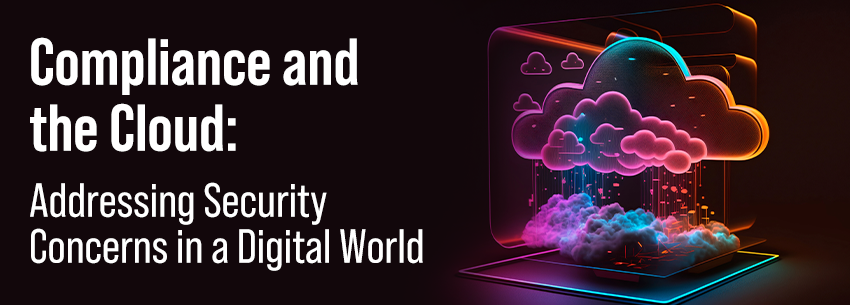Compliance and the Cloud: Addressing Security Concerns in a Digital World
More and more small and medium businesses (SMBs) are turning to the benefits of cloud computing, looking to realize the cost benefits, increased flexibility and scalability, enhanced capabilities, and other benefits that cloud technologies can bring. According to one report, 78 percent of small and medium businesses have already chosen to adopt the cloud, a percentage that only continues to grow.
However, while the benefits of cloud computing are clear, it is important as you evaluate these technologies and consider adopting them to ensure that security and compliance concerns are addressed to protect sensitive data. Cloud-based technologies aren’t inherently insecure, but like any technology, they come with risks that must be protected, especially in a world where cybersecurity threats continue to rise.
Cloud service providers assume some of this responsibility for securing the cloud, including securing the infrastructure itself that makes the cloud possible. But, it is left up to SMB owners to take additional steps within their environments to ensure cloud security and maintain security and compliance. This likely includes ensuring the security and privacy of data within cloud-based applications and in transit across the organization. It can also include ensuring access control and policies are set up correctly so only those who should have access to data can access it, as well as protections such as multi-factor authentication.
In addition to ensuring data security, there are several compliance and business regulations that you might have to comply with. For instance, businesses with customers in the European Union may have to meet General Data Protection Regulation (GDPR) standards. Meanwhile, if you are in healthcare, you likely must comply with HIPAA, or if you accept credit card payments, you must comply with PCI DSS.
You can take some steps to improve cloud compliance and security. First, you should educate yourself on the regulatory requirements that apply to your specific business, evaluate where you stand on meeting those requirements, and take steps to close any compliance gaps if needed. Additionally, you should evaluate cloud service providers and applications for their security and compliance track record before bringing them on board as a vendor.
Finally, it would be best to implement appropriate security measures within the organizations, such as access controls, encryption, and data backup, to protect your data. You may also consider training employees in security best practices, including how to identify and report security incidents should they occur.
Cloud security and compliance are critical to protecting sensitive data in a digital world. SMBs should understand the regulatory requirements that apply to them, choose a reputable cloud service provider, implement appropriate security measures, and train employees on security best practices. By taking these steps, you can improve cloud compliance and maintain security compliance in the cloud.





